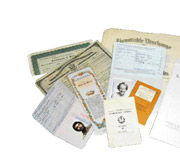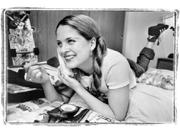ALL RIGHT, so now the Internet is supposed to be the “New Television.” Junk mail from AT&T asks, “What’s on the Internet tonight?” In the meantime, I become so alarmed whenever my computer makes any sound at all that I take the speakers off and hide them in the basement. My husband sighs and heads down there to fish them out; he gives me a lecture about the future of the Net and how it will change everything, how we will be living in the future without knowing it. Yet both he and I resist the notion that television will disappear, mostly because we take such comfort in it: the reassuring voices washing over you when you are too tired to move, the remote control cradled in your hand and the channels stretching out limitlessly, a blue glowing frontier.
At my grandmother’s house, the television constantly murmurs in the background; she can’t hear the stories much at all, but she finds the murmur reassuring. Once she asked me, “What are all those people on the news talking about, DOT this DOT that?” It took me a while to figure out she was asking about Web addresses. I tried to explain the whole thing but she looked at me blankly, then asked if I wanted a glass of wine.
The World Wide Web is one particular maze my 91-year-old grandmother will never need to enter. She lives in the web of television, dependent on it, captured by its particular noise, the shows spinning out like small and harmless dreams. A few shows she actually sits down for: The OJ trial held her hostage, and she religiously watches 60 Minutes every Sunday night. Like a lot of people in her generation, she believes in Mike Wallace and Andy Rooney. She believes in their centrality and their importance. She has faith in the ticking clock which signals the end of another Sunday, the ticking clock which seems to have existed since the beginning of time.
When I catch 60 Minutes, which is rare, I often get nostalgic for my grandmother and for the murmur of her life inside her house. In television terms, my nostalgia is for the days when the Big Three networks dominated; the holy trinity, when the American family gathered around the television like they used to gather around the radio on The Waltons.
But as many critics have noted, the Big Three have lost their power and lustre as cable has transformed the way Americans watch television. The tyranny of the 60 Minutes Sunday is over with. Pretty soon, my grandmother will be, too. “I’m living on borrowed time, honey, borrowed time,” she says, and then she turns the television up.
MAYBE TELEVISION has already disappeared and we just haven’t realized it. This was an idea I threw out to my husband when he was giving me the future talk. He said, “What do you mean?” I said, “Maybe television is the new radio, like it isn’t television anymore at all, it’s just noise, a million movies you’ve seen before, that you can quote back to yourself just like songs on the car radio.” He said, “Well, for you it is, but I don’t know if everyone else is like you.” He was referring to my habit of constantly playing television as background, just like my grandmother. “You are being subjective,” he said. “I know,” I said, “but I’m right.” “OK, honey,” he said, “you’re right.”
Think about it: As cable channels work more and more to appeal to various demographic niches, channel surfing resembles pressing the SEEK button on the radio: You know which station is oldies (Nick at Nite), which station is sappy or gloomy love songs (Lifetime), which is all boy rock (TNT Gangster week). Just as it is with radio, the religious kooks and con artists live at the beginning and the end of the dial.
In this way, cable programming, if it is diverse and varied as a whole, is also fantastically rigid. As a dedicated channel surfer, I know what to expect from which channel: When I’m craving Al Pacino spitting bullets, I tune to 54; Meredith Baxter Birney as a psycho mother, 51. Law and Order can be found on 52 pretty much all day. Chucky the evil doll seems to pop up everywhere, carrying his little axe with him. In the same way radio plays preprogrammed set lists, rotating the most popular songs through until you’re sick of them, cable channels obsessively play the same films over and over until they become meaningless, parodies of their former selves. How serious can you get about “violence on television” when Scarface is regularly interrupted by Downy commercials?
WHAT’S THE DIFFERENCE between movies and songs? Not much, really; it is all something that emerges from a box filled with wires into your room. The rush of relief when a great pop song comes on the radio is identical to the relief I feel when an evil cheerleader movie is playing on Lifetime. This is not a shallow form of joy: It exists down in the guts, in the heart, in the blood.
The notion that television can save your soul is something the wonderful singer/songwriter Joe Pernice sang about on the Scud Mountain Boys album The Early Year. In a track called “Television,” he crooned, “Television, send me a show/Television, you’re the only world I know.” It’s a song about loneliness and trying to forget lost worlds. It’s a love poem directed at the television. I often think about that Joe Pernice song when I search the channels for a movie I have seen before. Last week it was Mommie Dearest, playing for the 500th time on Bravo. I rediscover this masterpiece just as Joan Crawford/Faye Dunaway is embarking on one of her rages, her creepy daughter cowering in the doorway. I know the lines before they’re uttered: WHY DID YOU ADOPT ME??? Then Faye marching across the room, looking like the greatest drag queen on earth. Rapture, rapture.







